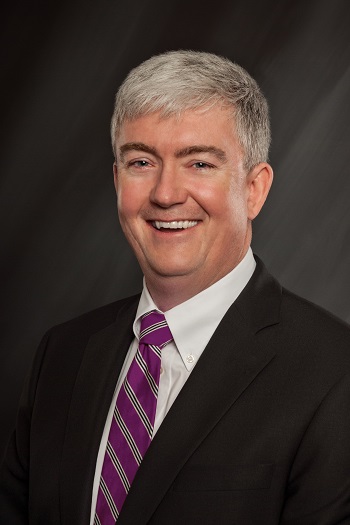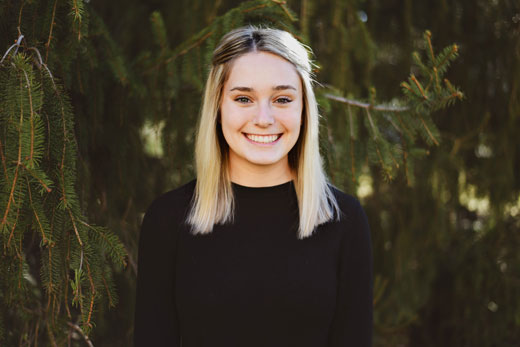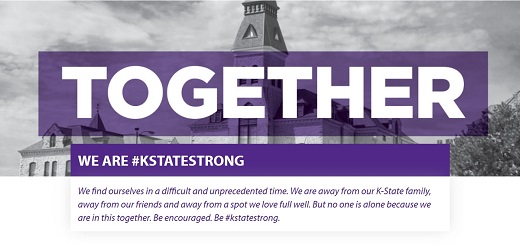04/22/20
K-State Current - April 22, 2020
K-State Current is a weekly news update for the Kansas Board of Regents to apprise the Regents on a few of the many successes and achievements made by K-State faculty, staff and students. 
K-State News
Visit K-State’s “We Are #KStateStrong” site to view brief videos designed to keep the K-State family engaged, connected and inspired during these challenging times.
Extension agents adapting well, continue serving Kansans, director says
The leader of the Kansas cooperative extension service, the major outreach arm of Kansas State University to the state’s residents, says that agents across the state are adapting to stay-at-home orders in creative ways to continue helping folks in their communities.
 Director for Extension Gregg Hadley noted that the threat of COVID-19 and health officials’ recommendations for people to “socially distance” themselves has changed traditional ways of delivering extension services.
Director for Extension Gregg Hadley noted that the threat of COVID-19 and health officials’ recommendations for people to “socially distance” themselves has changed traditional ways of delivering extension services.
“We are a cooperative extension system that is very used to, very good at – and prefer – face-to-face contact with the people we serve,” said Hadley, speaking on the April 1 broadcast of the Agriculture Today radio program.
“But under the COVID-19 threat, we just had to realize that we were not going to be able to do the face-to-face interactions, and that caused a whole host of challenges. For example, during these early spring months, a lot of times you have tagging and weigh-in of animals for 4-H, spring extension programs, project days, and those sort of things.
“We had to really think about how are we going to do these things and move forward and still provide all of the great information that the university has to the people of Kansas in different ways.”
Listen to Gregg Hadley on Agriculture Today
What has emerged in a matter of a few weeks, Hadley said, is a system that is using technology to deliver many of the same programs in imaginative ways.
“Just the other day, we had a very experienced agent, long-time educator in the southeast who did a burn workshop using Facebook Live,” Hadley said. “Prior to this, I don’t know that this agent would have considered that, because he is a face-to-face individual and has always worked that way. But in their heart of hearts, extension professionals are going to do whatever they have to do to serve the public.”
Hadley also noted “an excellent video” from the Post Rock extension district – which serves Lincoln, Mitchell, Jewell, Osborne and Smith counties – “of how to go to the grocery store and buy nutritious foods in realistic quantities, while keeping safe and preserving the safety of others.”
“A lot of activities like that are going on right now,” Hadley said.
Local K-State Research and Extension offices in some Kansas counties may still be open, likely with limited staffing. However, staff members in the state’s 105 counties are working and can be contacted by email or phone, according to Hadley. An interactive map of local extension offices, with contact information for each, is available online.
“If anybody needs service from their local extension office, they should still contact the office or use their personal contacts with their local extension agent,” he said.
Hadley has been taking questions about county fairs, a favorite summer activity in many Kansas towns. K-State Research and Extension does not govern county fairs – that is done by each local fair board which will decide whether its fair will be held this year.
“What I have been trying to tell (K-State Research and Extension employees) who are actively involved in their fairs is that we should first hope that the fairs go on as normal and everything is OK,” Hadley said.
“But we need to be thinking of backup activities. For example, if the fair does not go on, could we perhaps have a virtual fair where the 4-Hers can still exhibit their projects on a website or (other platform) and still give that 4-Her a capstone event to look forward to this summer?”
Hadley said he thinks the current crisis may help to improve the ways in which K-State Research and Extension delivers information.
“As with any crisis, you look for the opportunity to improve your service to the people of Kansas,” he said. “We may see once this is all over, some activities go back to face-to-face contact, and that will work really well. And there will be other things that we say, ‘hey this worked really well with technology, so why don’t we continue to keep doing this?’”
Hadley’s full interview on Agriculture Today is available online.
Matthew J. O'Keefe named new dean of Carl R. Ice College of Engineering
An accomplished materials engineer and experienced administrator will become the next dean of the Carl R. Ice College of Engineering at Kansas State University.
 Matthew J. O'Keefe, executive director of the Haley Barbour Center for Manufacturing Excellence and professor of chemical engineering at the University of Mississippi, has been appointed to the post by K-State Provost Charles Taber following a national search. As part of the appointment, O'Keefe will hold the LeRoy C. and Aileen H. Paslay Chair in Engineering. He will start his new duties on July 13.
Matthew J. O'Keefe, executive director of the Haley Barbour Center for Manufacturing Excellence and professor of chemical engineering at the University of Mississippi, has been appointed to the post by K-State Provost Charles Taber following a national search. As part of the appointment, O'Keefe will hold the LeRoy C. and Aileen H. Paslay Chair in Engineering. He will start his new duties on July 13.
"Dr. O'Keefe is well prepared to become the next chief administrator of the Carl R. Ice College of Engineering," Taber said. "With his distinguished record in academia and industry, Dr. O'Keefe understands the impact of engineering and computing on society, knows the challenges coming in these technology-based areas and has the leadership and innovative thinking skills to empower the faculty, staff, students and alumni of the Carl R. Ice College of Engineering to meet these challenges and lead this college into the future."
As dean, O'Keefe will be responsible for the oversight and direction of the college's teaching, research, extension outreach, public engagement, fiscal stewardship and fundraising efforts. He will oversee the state's most comprehensive engineering school with more than 3,400 undergraduates and 400 graduate students, as well as more than 160 faculty involved with the college's 12 degree programs housed in eight departments.
"I am honored to have been chosen as the dean of the Carl R. Ice College of Engineering and want to thank Provost Taber, Dean Gwinner and the search committee, Carl and Mary Ice, and everyone involved in the process for the opportunity to serve and lead the college," O'Keefe said. "Having collaborated with K-State engineering faculty and students on research projects, and working with K-State-educated engineers throughout my career, there was immediate interest in applying for the position. Knowing firsthand that K-State graduates and faculty are highly respected nationally and internationally, and having positive interactions with the professional staff and alumni on numerous occasions, it was a privilege to have been nominated as the next Leroy C. and Aileen H. Paslay endowed chair and dean of engineering."
O'Keefe has served in his current position since 2017 and provides administrative oversight of the center's personnel, facilities, operations and academics. The center's honors program serves more than 200 undergraduate students in accounting, business and engineering pursuing a minor in manufacturing, developing them into leaders, innovators and entrepreneurs of modern manufacturing. As its executive director, O'Keefe has increased the center's student enrollment and diversity by 10%, helped establish initial program endowments and expanded the number of degree programs associated with the center, among other accomplishments.
Before joining the University of Mississippi, O'Keefe was with the Missouri University of Science and Technology from 1999 to 2017 where he served as chair of the Department of Material Science and Engineering from 2016-2017. Under his leadership, he helped the department secure a $3 million estate gift and oversaw annual research expenditures of approximately $4 million. O'Keefe also served as director and senior investigator for Missouri S&T's Graduate Center for Materials Research from 2007-2016. The center accounts for 75% of patents and royalty income at the university. In addition, he was the interim assistant vice chancellor of global learning at Missouri S&T from 2015-2016.
As a researcher, O'Keefe focuses on thin films, coatings, environmentally friendly processing and characterization of materials. He has been principal investigator on more than $10 million in funded research and another $24 million as a co-principal investigator. A fellow of ASM International, O'Keefe is co-inventor on six issued patents, three of which are licensed and generate royalties. He has published more than 140 peer-reviewed and conference proceedings papers and has served as a peer reviewer for 20 journals. He also has supported and advised 11 master's and 12 doctoral students, as well as 11 postdoctoral fellows. His work has earned eight faculty excellence awards, three outstanding teaching awards and three best paper awards.
O'Keefe began his career as a planning engineer with AT&T Microelectronics in Lee's Summit, Missouri, from 1985-1988, then transferred to AT&T Bell Laboratories in Allentown, Pennsylvania, conducting applied research and development for manufacturing locations from 1988-1990. He also worked as a materials research engineer at the Air Force Research Laboratory at Wright-Patterson Air Force Base from 1990-1999.
O'Keefe earned his bachelor's degree in metallurgical engineering from the University of Missouri, Rolla — now Missouri S&T — and a doctorate in metallurgical engineering from the University of Illinois.
K-State Faculty Highlights
K-State team funded by $1.3 million NIH grant to combat hypertension
The underlying cause in up to 12% of people with hypertension or high blood pressure can be traced to primary aldosteronism, or PA, a disorder characterized by the unregulated production of the hormone aldosterone due to benign tumors in the adrenal gland.
 A team of researchers, led by Kansas State University associate professor Punit Prakash, has been funded with more than $1.3 million from the National Institutes of Health to expand preliminary studies that indicate mild heating of benign adrenal tumors can disrupt their unregulated aldosterone production. Through the U.S-Ireland Research and Development Partnership, project partners in the Republic of Ireland and Northern Ireland will receive additional funding from related agencies in their countries.
A team of researchers, led by Kansas State University associate professor Punit Prakash, has been funded with more than $1.3 million from the National Institutes of Health to expand preliminary studies that indicate mild heating of benign adrenal tumors can disrupt their unregulated aldosterone production. Through the U.S-Ireland Research and Development Partnership, project partners in the Republic of Ireland and Northern Ireland will receive additional funding from related agencies in their countries.
"We will develop, optimize and evaluate an approach for definitive treatment of PA, employing minimally invasive microwave devices delivered under image guidance to selectively heat benign adrenal tumors," said Prakash, who holds the Paul L. Spainhour Professorship in Electrical Engineering and is a Michelle Munson-Serban Simu Keystone research scholar in the Mike Wiegers Department of Electrical and Computer Engineering
.
"Successful completion of this project," he said, "will lead to the development of a minimally invasive approach for definitive treatment of hypertensive patients with benign aldosterone-producing adenomas in one or both adrenal glands."
Co-investigators at K-State include faculty members Stefan Bossmann, university distinguished professor of chemistry; Warren Beard and David Biller, professors of clinical sciences; Charan Ganta, clinical associate professor of diagnostic medicine and pathobiology; and Matthew Basel, clinical assistant professor of anatomy and physiology. The Republic of Ireland project partners at National University of Ireland Galway are M. Conall Dennedy, site lead, and Martin O'Halloran. At Ulster University in Northern Ireland, project partners are Liam McDaid, site lead, and Jim Harkin and Bryan Gardiner.
The NIH project, with program sponsor the National Institute of Biomedical Imaging and Bioengineering in the U.S. Department of Health and Human Services, will be funded over four years through the Bioengineering Research Grants program.
The project, titled "Treating primary aldosteronism-induced hypertension via microwave thermal therapy," is well-aligned with the Carl R. Ice College of Engineering's health research thrust as well as the internationalization theme of K-State 2025.
Veterinary researcher receives $1.58 million NIH grant to explore pathway for better cancer therapies
 An illustration of the Hippo pathway.
An illustration of the Hippo pathway.
New research at Kansas State University is following a unique pathway that could lead to innovative therapies for treating cancer and other human disorders.
Jianzhong Yu, an assistant professor in the College of Veterinary Medicine, recently received a National Institutes of Health R01 Grant totaling $1,580,922 over five years to uncover how an evolutionary pathway may affect tumor development and cancer.
The study, "Upstream regulation of the Hippo signaling pathway," will explore the molecular and cellular function of a novel regulator.
Originally discovered in the Drosophila fruit fly, the Hippo pathway is a key regulator of tissue growth in both the fruit fly and mammals. Its dysfunction has been implicated in a wide range of human disorders, including cancer.
"Given the strong link between Hippo pathway dysfunction and human cancer, Hippo pathway represents a clear target for cancer therapy," Yu said. "The Hippo pathway responds to a variety of extracellular signals such as contact-inhibition and mechanical forces, but the underlying mechanisms remain unclear."
The objective of Yu's study is to answer that question. His group will first characterize a novel key regulator for the Hippo pathway, then determine how it regulates Hippo pathway function, and explore how this regulation affects Hippo pathway function in tissue growth.
"We believe our research will provide a novel mechanistic understanding of how Hippo pathway upstream signals are coordinated," Yu said. "As we learn more about these functions, we think it will be much easier to learn how to develop new treatments and therapies."
K-State Student News
University's 36th Truman scholar seeks to empower women, stop food insecurity
 Sara Gammon, Kansas State University senior in agriculture economics and global food systems leadership, Drexel, Missouri, has received a 2020 Harry S. Truman Scholarship.
Sara Gammon, Kansas State University senior in agriculture economics and global food systems leadership, Drexel, Missouri, has received a 2020 Harry S. Truman Scholarship.
The Truman scholarship is a highly competitive national award that provides up to $30,000 for graduate study to students committed to future careers in public service. According to the Truman Foundation, 62 scholarships were awarded this year from a candidate pool of 773 students nominated by 316 colleges and universities.
Gammon is the 36th K-State student to receive the prestigious scholarship.
"Sara Gammon's history of public service, leadership and academic achievement made her an ideal Truman scholar," said President Richard Myers. "She's very deserving of this prestigious scholarship. Her hard work and dedication represent Kansas State University's land-grant mission well."
Gammon will begin a one-year Master of Philosophy in development studies program at Cambridge University in September 2020, followed by a one-year Master of Science in development economics at SOAS University of London. According to Gammon, she will apply these degrees to help empower women in agriculture.
"I hope to eventually work for the Food and Agriculture Organization of the United Nations in the Agricultural Development Economics Division, where I can focus my research and projects on eliminating hunger, food insecurity and malnutrition through improving gender equality," Gammon said.
Gammon has seen the challenge of international gender inequality firsthand in several different settings. During summer 2017, she conducted research on the rural dairy economy in India as a 2017 Borlaug Ruan intern in association with the World Food Prize. During summer 2018, she worked as a K-State International Service Team volunteer at the Children and Youth Empowerment Centre in Kenya.
"I believe that women's empowerment is vital to moving the world forward and lifting people from poverty to prosperity," Gammon said. "I was lucky to be born with the privilege to go to school and have a career; I won the lottery of life. Because of this, I believe my life's purpose is to use my education and privilege to help those who are not as fortunate. By breaking the barriers, we can not only empower women, but we can also empower the world."
Gammon has served in many leadership and public service roles. She currently is the Student Governing Association director of food insecurity and president of Collegiate Farm Bureau. She was a College of Agriculture caucus leader and senator, and vice president of political outreach and fellow for the Collegiate Farm Bureau from 2018-2019; an advisory board member and volunteer for the Cats' Cupboard; and is a member of Gamma Sigma Delta. She also served as a member of the Model United Nations Competition Team. In addition, she was a Cargill fellow from 2018-2019 and fundraising chair for Quest Freshman Honorary from 2017-2018.
In addition to the Truman scholarship, Gammon has received the David and Susan Barton Cooperative Leadership Scholarship, the Gamma Sigma Delta Outstanding First-Year Performance Award and the McKelvie Scholarship. She was a national finalist in the FFA Agriscience Research competition and received second place in the Kansas Farm Bureau Discussion Meet. She co-authored "A Brief History of Farm Management" published in the Journal of the American Society of Farm Managers and Rural Appraisers.
